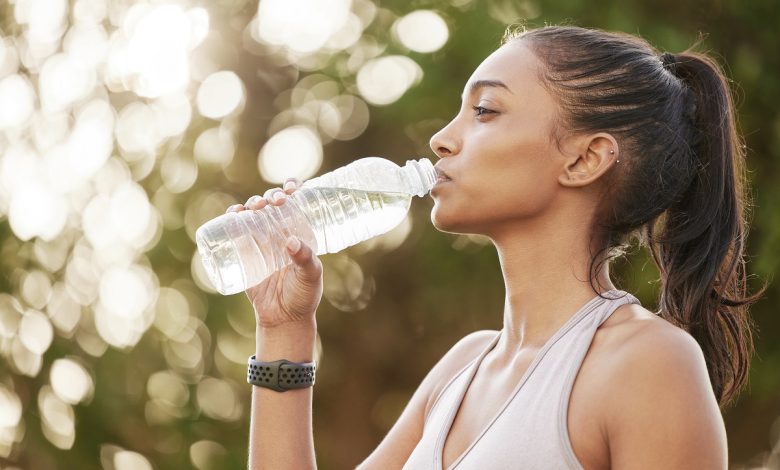Drinking Water: Benefits Of Drinking Water For Health

Benefits Of Drinking Water: Drinking water (potable water) is derived from a surface, groundwater, precipitation, or recycled source that meets quality and safety standards to make it safe for human consumption.
Water is vital for life and makes up 50% (females) to 60% (males) of an adult’s body weight. Physiologically, water is the main constituent of cells, tissues, and organs. It supports numerous biological processes and ensures homeostatic functioning by acting as a building material, solvent, and participant in enzymatic reactions, transporter of nutrients and wastes, thermoregulatory, lubricant, and an essential component of blood.
Benefits Of Drinking Water, Drinking water contains nutritionally beneficial minerals such as sodium, potassium, calcium, magnesium, and phosphate. People obtain the majority of their mineral needs from food, but water containing these minerals represents a useful supplement.
Sufficient, safe, acceptable, physically accessible, and affordable water for personal and domestic use is recognized by the United Nations as a fundamental human right. Lack of water as a fundamental resource is associated with emotional distress and negative mental health outcomes according to researchers at Arizona State University.
Benefits Of Drinking Water, As a result, questions arise regarding how much water you should drink per day, the benefits of drinking water in the morning, the benefits of drinking water during dinner, the benefits of drinking a lot of water, and whether drinking a gallon of water per day may give the full benefits of hydration. In this article, we will evaluate the 10 benefits of drinking water.
1. Improves Physical Performance

Benefits Of Drinking Water, Physical performance, from a medical point of view, objectively measures whole body function related to mobility. It takes into account not only muscle strength, power, and endurance, but inputs from many other body organs and systems such as bones, balance, as well as various cardiovascular and neurologic aspects.
Substantial research has been conducted on the effects of hydration status on physical performance and related responses in occupational, military, and sports settings. This research has shown that dehydration or hypohydration provokes functional changes in cardiovascular, metabolic, and central nervous systems resulting in the impairment of physical performance. This impairment can be manifested by reduced endurance, increased fatigue, altered thermoregulatory capability, reduced motivation, and increased perceived effort.
Benefits Of Drinking Water, A study from the American College of Sports Medicine showed that dehydration resulting in a loss of as little as 2% of body mass can be associated with a decline in physical performance. Another study conducted by researchers from the Department of Physiology of the Australian Institute of Sport found that low fluid intake in cyclers resulted in a relative performance impairment of 28.6%.
Since even minor percentages of water loss can have an impact on physical performance, drinking water and staying adequately hydrated during all types of physical activity is important for maintaining peak physical performance.
2. Increases Energy

Benefits Of Drinking Water, Energy refers to the strength and vitality required for sustained physical or mental activity.
In the human body, energy is derived from dietary “fuel molecules”, namely carbohydrates, lipids, and proteins. These fuel molecules and their nutrient constituents (glucose, fatty acids, amino acids) subsequently undergo complex biochemical pathways to synthesize high-energy compounds, such as ATP, which functions as the main energy carrier in all cells.
Benefits Of Drinking Water, Drinking water is essential for all metabolic and biochemical pathways that are involved in the synthesis of high-energy compounds, which give all cells of your body fuel to function.
3. Improves Brain Function

Benefits Of Drinking Water, Water improves brain functions such as concentration and memory. The human brain controls all activities of our bodies. These include cognitive functions such as learning and remembering, motor functions, vision, and essential life functions such as breathing, heart rate, and even hunger.
Adequate hydration is important for optimal brain function. Studies have examined the effects of dehydration under different circumstances on brain functioning and have found that mild to moderate dehydration can alter important aspects of cognitive function such as concentration, alertness, memory, perceptual discrimination, arithmetic ability, visuomotor tracking, and psychomotor skills. As such, maintenance of adequate hydration by drinking water in hot climates and during vigorous exercise can help maintain optimal brain function.
Benefits Of Drinking Water, A study conducted at Peking University entitled “Effects of Dehydration and Rehydration” followed 12 men who abstained from drinking water for 36 hours. Their mood and cognitive function tested before and after the 36 hours, with their average results coming out as seen in the charts below. Researchers concluded that dehydration had considerable negative effects on energy levels, attention, focus, and even short-term memory.
4. Treats Constipation

Benefits Of Drinking Water, Drinking water treats constipation that arises from insufficient fluid intake, especially when one has diarrhea or fever which promote dehydration. Constipation refers to difficult or infrequent bowel movements, hard stool, or a feeling that the rectum is not totally empty after a bowel movement.
Among numerous causes of constipation are dietary causes. The most important factors that promote constipation include reduced physical activity and inadequate intake of fibers, carbohydrates, and fluids. Constipation from these factors can be prevented by combining regular physical exercise with increased dietary fiber and water intake. The World Gastroenterology Organization’s guidelines on constipation include increased water intake as part of the treatment of constipation.
Benefits Of Drinking Water, Constipation may result from illnesses such as diarrhea and fever, which promote dehydration and thus increase constipation. This type of secondary constipation is especially common among the very young and very old, for whom it is extra important to maintain good hydration to prevent constipation.
According to a study published in the European Journal of Nutrition, certain mineral waters rich in magnesium and sodium improves bowel movement frequency and consistency during constipation, especially in infants. The following mineral water brands profiled by the Fine Water Society contain high levels of magnesium or sodium.
5. Helps for Kidney Stones

Benefits Of Drinking Water, Urinary stones are collections of mineral crystals (calcium, uric acid, struvite, cystine) that occur in the urinary system and can cause significant discomfort. Kidney stones, which originate in the kidneys, are the most common type.
Kidney stones are formed when waste materials in the blood crystallize and accumulate inside the kidneys, which may build up over time to create a hard stone-like mass. Dehydration is one of the factors associated with the formation of uric acid kidney stones. Increased fluid consumption is recommended for those individuals predisposed to the formation of uric acid stones.
Benefits Of Drinking Water, Increased fluid intake increases the volume of urine going through the kidneys, thus diluting the concentration of minerals and making them less prone to crystallization and formation of stones. The American Urological Association, recommends that those who are prone to kidney stones should drink enough fluid to generate 2.5 liters (85 oz) of urine each day. On average, this equates to around 3 liters (100 oz) of liquids consumed every day.
6. Helps for Weight Loss

Benefits Of Drinking Water, Drinking water helps weight loss by increasing feelings of being full, raising metabolism, and acting as a substitute for sugary drinks. Weight loss is defined as a reduction in total body weight induced by either voluntary or involuntary circumstances.
Increasing water consumption may help weight reduction by raising metabolism, which can increase the number of calories burned daily.
Benefits Of Drinking Water, Consumption of water at least 30 minutes prior to meals has been shown to help weight loss, likely due in part to increased feelings of being full before eating. In one study, dieters who drank 16.9 ounces (0.5 liters) of water before meals lost 44% more weight over a period of 12 weeks than dieters who didn’t drink water before meals.
7. Prevents Hangovers

Benefits Of Drinking Water, Hangovers are the unpleasant side effects of alcohol consumption and are manifested by headaches, fatigue, thirst, dizziness, nausea, and a loss of appetite.
The major cause of hangover symptoms is alcohol-induced dehydration. Alcohol has a strong diuretic effect, therefore it increases urine production, resulting in a loss of fluids and electrolytes required for normal functioning.
Benefits Of Drinking Water, Although the best way to prevent a hangover is to not drink more than you know you can handle, drinking water helps. The National Health Service (NHS) of the United Kingdom recommends drinking water in between each alcoholic drink, as well as drinking at least 2 cups (16 oz) of water before going to sleep.
8. Prevents Dehydration

Benefits Of Drinking Water, Dehydration refers to a significant loss of body water and electrolytes at a rate greater than the body’s ability to restore it. Varying degrees of dehydration can be manifested by thirst, lethargy, altered sensorium, decreased cognition, dry mucosa, decreased urine output, tachycardia, hypotension, and shock.
Dehydration is caused by increased fluid loss (vomiting, diarrhea, excessive sweating, burns), decreased fluid intake (pharyngitis, other debilitating illnesses), or both. Preventing dehydration can be accomplished by drinking sufficient water daily, as generally guided by one’s own sense of thirst.
As a general volumetric guideline of how much fluid one should drink per day to avoid dehydration, the standard daily recommendations from the US National Academies of Sciences, Engineering, and Medicines is a good starting point. 3.7 liters (a little less than a gallon or 16 cups) of liquids a day for men and 2.7 liters (0.7 gallons or 11 cups) for women, which can then be adjusted based on factors like geographical location, temperature, activity levels, and age.
Benefits Of Drinking Water, For example, if a person is performing strenuous physical exercise during a hot summer day, they should increase their water intake beyond the minimum requirement in order to prevent dehydration.
9. Carries Oxygen to Cells

Benefits Of Drinking Water, The oxygen absorbed through the lungs from the surrounding air is bound to red blood cells which are “dissolved” in plasma, the liquid component of blood that allows circulation. Plasma is 90% water, therefore water acts as a carrier medium that allows for blood circulation, which is essential for the delivery of oxygen and nutrients to all cells.
Plasma normally makes up 55% of the body’s total blood volume. Maintenance of plasma volume is performed by a complex system involving the renal and the neuroendocrine systems. Under normal circumstances, all that is needed to maintain the plasma volume necessary to remove waste products and transport oxygen and nutrients is to adhere to the recommended daily water intake requirements and to let our bodies do the rest.
10. Improves Digestion

Benefits Of Drinking Water, Digestion is the process through which insoluble dietary macronutrients such as fats, carbohydrates, and proteins are mechanically and enzymatically broken down into micronutrients that can cross the intestinal epithelium and enter the bloodstream for use in the body.
Digestion begins in the mouth with chewing and ends in the small intestine. As food moves through the gastrointestinal tract, it mixes with digestive fluids (saliva, stomach acid, pancreatic juice, bile acids) causing big molecules of food to break down into smaller ones that are absorbed.
Water is required for proper digestive functioning. It provides lubrication of mucous membranes in the gastrointestinal tract, helps in breaking down meals in conjunction with gastric acid and enzymes, promotes gastric emptying, promotes intestinal motility, and assists in the control of bowel movements.
Benefits Of Drinking Water, Dehydration and hypohydration promote poor digestive health and are associated with delayed digestion, bloating gastric acid reflux, and constipation. For example, researchers from the Department of Gastroenterology at the University Hospital Maastricht found that dehydration leads to delayed gastric emptying. Adhering to the recommended daily liquid intake of 2.7 liters for women and 3.7 liters for men (adjust to personal circumstances) will help ensure healthy digestion.
Also Read:
10 Best Home Remedies For Treat Sore Throat




